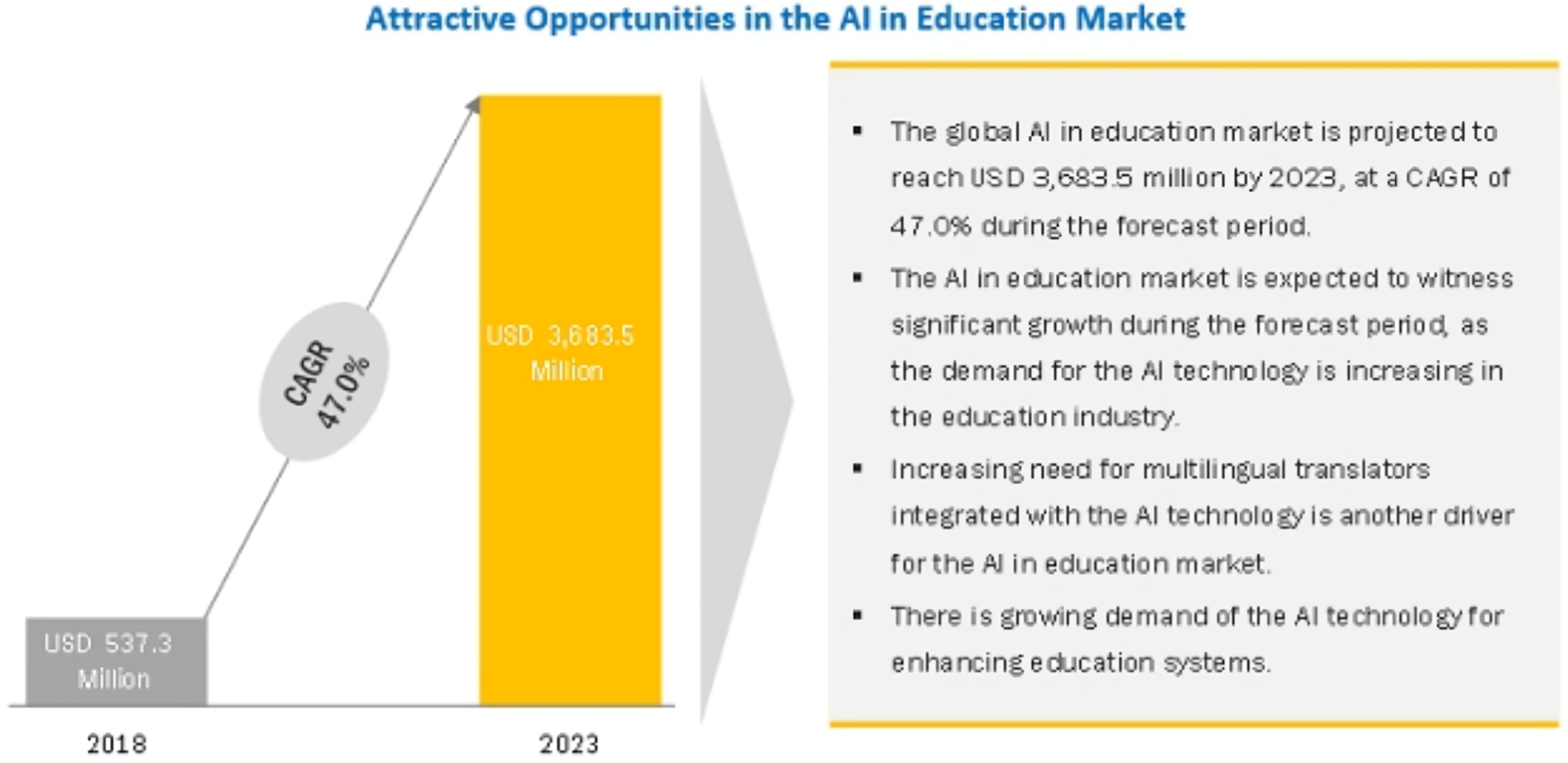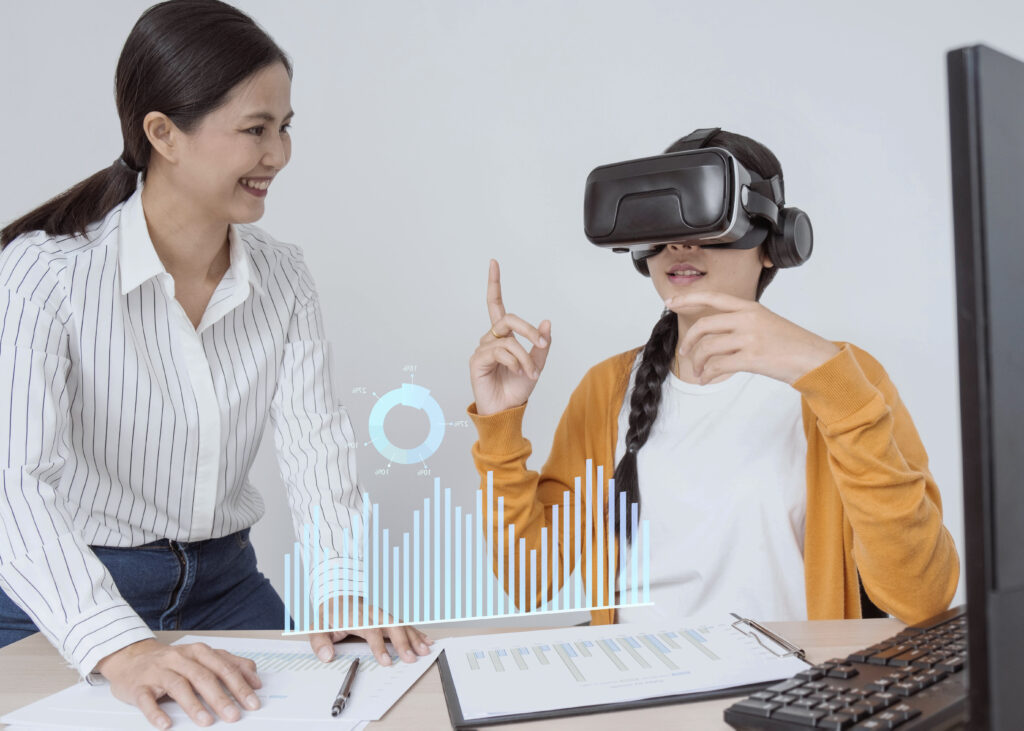Artificial intelligence (AI) is transforming the world of education in ways we couldn’t have imagined just a few years ago. From personalised learning to adaptive assessments, AI revolutionises how we teach and learn. In this article, we’ll explore the future of AI in education, what it can do for teachers, and how educators can prepare for an AI-enhanced future.
The Future of AI in Education
The future of AI in education is bright. According to a report by Markets and Markets, the global AI market in education is expected to grow at a CAGR of 47% from 2018 to 2023. The increasing demand for personalised learning, adaptive assessments, and intelligent tutoring systems drives this growth.
AI can transform every aspect of education, from curriculum design to assessment to student engagement. With AI, teachers can personalise learning experiences for each student, identify learning gaps, and provide targeted interventions. AI-powered assessments can adapt to the student’s level of knowledge and provide immediate feedback. Intelligent tutoring systems can provide students with real-time feedback and support, allowing them to learn at their own pace.

Attractive Opportunities of the AI in Education Market
Source: Markets and Markets
What Can AI Do for Teachers Now?
AI can do a lot for teachers. By automating routine tasks and analysing and visualising vast data, AI frees up time for teachers to focus on what they do best: teaching. With AI, teachers can:
- Personalise learning experiences: AI can analyse student learning data to identify gaps and provide targeted interventions.
- Adaptive assessment and learning content: with content generation ability, AI can create dynamic quizzes or learning materials that follow student’s progress
- Automate grading: AI-powered assessments can grade student work automatically, saving teachers time and providing students with immediate feedback.
- Provide real-time feedback: Intelligent tutoring systems can provide students with real-time feedback and support, allowing them to learn at their own pace.
- Enhance collaboration: AI-powered collaboration tools can help students work together more effectively, regardless of location.
- Streamline administrative tasks: AI can automate routine tasks such as tracking attendance and scheduling.
Read More: Educator’s Challenges in Teaching 2023
Try the AI power for free with HeyHi here!
How Can Teachers Prepare for an AI-Enhanced Future?
Teachers must develop new skills and perspectives and adapt to new teaching methods to prepare for an AI-enhanced future. Here are a few things teachers can do to prepare:
- Surely, learn about AI: Educators need to stay up-to-date on the latest developments in AI and their existing or possible use cases in education.
- Embrace new technologies: Teachers must be open to and willing to experiment with them in the classroom.
- Develop data literacy skills: Teachers need to be able to analyse and interpret data to personalise learning experiences for their students.
- Foster a growth mindset: Teachers must encourage their students to embrace a growth mindset and view failure as an opportunity to learn.
- Collaborate with other educators: Teachers must collaborate to share best practices and learn from each other.
Read More: 5 Best Test and Quiz Makers for Educators
Read More: 5 Effective Blended Learning Tools for New Normal Classroom
The Developments of Artificial Intelligence in the Future
The plan for AI in the future is to continue to develop and refine AI-powered tools and applications for education. This includes developing more sophisticated AI algorithms and models and creating new AI-powered tools for teaching and learning. The goal is to create a more personalised and adaptive learning environment that meets the unique needs of each student.
In the future, even more developments in artificial intelligence will be made to support education more. Some of the developments expected include:
- More sophisticated natural language processing algorithms that can understand and respond to student questions and comments.
- AI-powered virtual tutors provide students with additional personalised support and guidance besides classroom teaching.
- AI curricula frameworks to emerge, guiding the integration of AI in education
- AI can provide personalised learning experiences for students by identifying their interests and suggesting engaging content.
- Generative AI, which can create new content based on existing data, is expected to play a significant role in education.
- Various AI tools are expected to be integrated into educational software for student use aside from tutor-centred tools.
Will AI Replace Teachers in Education?
No, AI will not replace teachers in education. While AI can automate routine tasks and provide personalised support for students, it cannot replace the human touch teachers bring to the classroom. Teachers play a critical role in fostering creativity, critical thinking, and social-emotional learning, essential skills for success in the 21st century.
Conclusion
AI is transforming the world of education, and teachers need to be prepared for an AI-enhanced future. By embracing new technologies, developing new skills, and collaborating with other educators, teachers can create a more personalised and adaptive learning environment for their students.
With the right AI tools and applications, teachers can provide students with personalised support and guidance, adapt assessments to their level of knowledge, and provide real-time feedback and support. But while AI can automate routine tasks and provide targeted interventions, it cannot replace the human touch teachers bring to the classroom. Teachers play a critical role in fostering creativity, critical thinking, and social-emotional learning, essential skills for success in the 21st century.
References:
